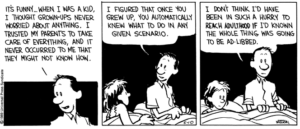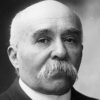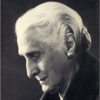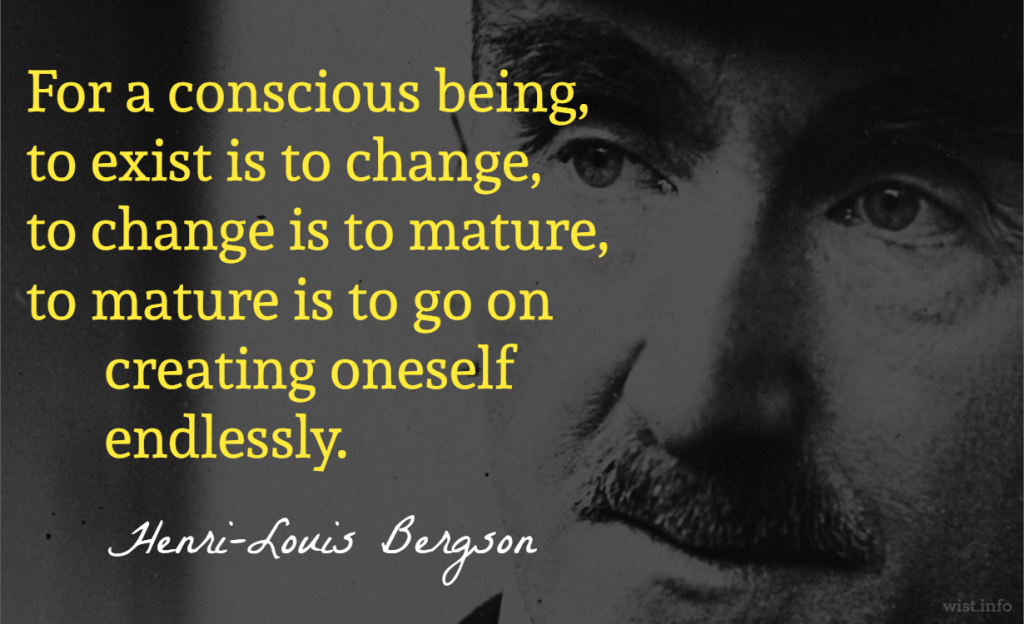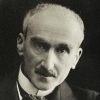GALE: Childhood is Last Chance Gulch for happiness. After that, you know too much.
Tom Stoppard (b. 1937) Czech-English playwright and screenwriter
Where Are They Now? (1968)
(Source)
Quotations about:
maturity
Note not all quotations have been tagged, so Search may find additional quotes on this topic.
The uses of a dictionary: at thirteen we look up lewd, licentious, lascivious; at thirty, febrile and inchoate; at fifty, endostosis.
Mignon McLaughlin (1913-1983) American journalist and author
The Neurotic’s Notebook, ch. 10 (1963)
(Source)
Man comes to each age of his life as a novice.
[L’homme arrive novice à chaque âge de la vie.]
Nicolas Chamfort (1741-1794) French writer, epigrammist (b. Nicolas-Sébastien Roch)
Products of Perfected Civilization [Produits de la Civilisation Perfectionnée], Part 2 “Characters and Anecdotes [Caractères et Anecdotes],” ch. 12 (1795) [tr. Merwin (1969)]
(Source)
(Source (French)). Alternate translations:
Man arrives a novice at every age of life.
[ed. Mathews (1878)]
Man reaches each stage in his life as a novice.
[tr. Hutchinson (1902), "The Cynic's Breviary"]
A man begins every stage of his life as a novice.
[tr. Parmée (2003), ¶ 422]
Few books can please us throughout life. For some we lose all liking as we grow in age, wisdom, or good sense.
[Peu de livres peuvent plaire toute la vie. Il y en a dont on se dégoûte avec le temps, la sagesse ou le bon sens.]
Joseph Joubert (1754-1824) French moralist, philosopher, essayist, poet
Pensées [Thoughts], ch. 23 “Des Qualités de l’Écrivain [Of the Qualities of Writers],” ¶ 178 (1850 ed.) [tr. Attwell (1896), ¶ 375]
(Source)
(Source (French)). Alternate translations:
Few books give life-long pleasure. There are some for which, with the growth of time, wisdom, and good sense, we lose all taste.
[tr. Lyttelton (1899), ch. 22, ¶ 84]
CALVIN’S DAD: It’s funny … when I was a kid, I thought grown-ups never worried about anything. I trusted my parents to take care of everything, and it never occurred to me that they might not know how. I figured that once you grew up, you automatically knew what to do in any given scenario. I don’t think I would have been in such a hurry to reach adulthood if I’d know the whole thing was going to be ad-libbed.
Bill Watterson (b. 1958) American cartoonist
Calvin and Hobbes (1989-05-10)
(Source)
After their house has been burgled.
Nothing — so it seems to me — is more beautiful than the love that has weathered the storms of life. The sweet, tender blossom that flowers in the heart of the young — in hearts such as yours — that, too, is beautiful. The love of the young for the young, that is the beginning of life. But the love of the old for the old, that is the beginning of — of things longer.
Jerome K. Jerome (1859-1927) English writer, humorist [Jerome Klapka Jerome]
“Passing of the Third Floor Back” [The Stranger] (1908)
(Source)
If you reside in a state where you attain your legal majority while still in your teens, pretend that you don’t. There isn’t an adult alive who would want to be contractually bound by a decision he came to at the age of nineteen.
One ov the most diffikult, and at the sametime one ov the most necessary, things for us old phellows to know, is that we aint ov so mutch ackount now az we waz.
[One of the most difficult, and at the same time one of the most necessary, things for us old fellows to know, is that we aren’t of so much account now as we were.]Josh Billings (1818-1885) American humorist, aphorist [pseud. of Henry Wheeler Shaw]
Everybody’s Friend, Or; Josh Billing’s Encyclopedia and Proverbial Philosophy of Wit and Humor, ch. 131 “Affurisms: Plum Pits (1)” (1874)
(Source)
The superstition into which we’re born,
Even when we recognize it, loses not
Its power on us! Not all those are free
Who ridicule their chains.[Der Aberglaub’, in dem wir aufgewachsen,
Verliert, auch wenn wir ihn erkennen, darum
Doch seine Macht nicht über uns. — Es sind
Nicht alle frei, die ihrer Ketten spotten.]Gotthold Lessing (1729-1781) German playwright, philosopher, dramaturg, writer
Nathan the Wise [Nathan der Weise], Act 4, sc. 4 [Templar] (1779) [tr. Corbett (1883)]
(Source)
(Source (German)). Alternate translations:
Yet the superstition
in which we have grown up, not therefore loses
when we detect it, all its influence on us.
Not all are free that can bemock their fetters.
[tr. Taylor (1790)]
The superstition in which we grew up,
Does not cease influencing us, e'en after
We have discover'd its absurdity.
Not all are free who do bemock their fetters.
[tr. Reich (1860)]
The superstition in which we were brought up never loses its power over us, even after we understand it.
[Source (1866)]
And yet the superstitions we have learned
From education, do not lose their power
When we have found them out; nor are all free
Whose judgment mocks the galling chains they wear.
[tr. Boylan (1878)]
The superstition in which we have grown up
Does not lose (even if we see through it)
Its power on us, on that account;
All are not free who mock their chains.
[tr. Jacks (1894)]
The superstitions of our early years,
E'en when we know them to be nothing more,
Lose not for that their hold upon our hearts;
Not all are free who ridicule their chains.
[tr. Maxwell (1917)]
The superstition in which we have grown up does not lose its power over us even for the reason that we recognize it as such. Not all are free who mock their chains.
[tr. Reinhardt (1950)]
The superstition in which we grew up,
Though we may recognize it, does not lose
Its power over us -- Not all are free
Who make mock of their chains.
[tr. Morgan (1955)]
Merely because we see the defects of the superstition we grew up in, it doesn't lose its hold upon our souls! Those men who mock their chains are not all free!
[tr. Ade (1972)]
Maturity is a bitter disappointment for which no remedy exists, unless laughter can be said to remedy anything.
Kurt Vonnegut, Jr. (1922-2007) American novelist, journalist
Cat’s Cradle, ch. 88 [Bokonon] (1963)
(Source)
The awareness of the ambiguity of one’s highest achievements (as well as one’s deepest failures) is a definite symptom of maturity.
Paul Tillich (1886-1965) American theologian and philosopher
Quoted in Time (1963-05-17)
(Source)
Speech given at the 40th Anniversary Dinner for Time, reported in the following week's magazine.
That the world can be improved and yet must be celebrated as it is are contradictions. The beginning of maturity may be the recognition that both are true.
William M. Stott (b. 1940) American diplomat, academic in American Studies and English, author
Documentary Expression and Thirties America, ch. 15 (1973)
(Source)
Closing words of the book.
Mature people relate to each other without the need to merge.
Maturity is a high price to pay for growing up.
Tom Stoppard (b. 1937) Czech-English playwright and screenwriter
Where Are They Now? [Gale] (1970)
(Source)
The line in the play -- originally broadcast on BBC Radio 3 -- was based on an answer Stoppard himself gave in an interview by Peter Evans, reprinted in David Bailey and Peter Evans, Goodbye Baby and Amen: A Saraband for the Sixties (1969):
It is a very immature thing to worry about one’s stinking youth, but I don’t care: I think age is a very high price to pay for maturity.
But genius is nothing more nor less than childhood recovered at will — a childhood now equipped for self-expression with manhood’s capacities and a power of analysis which enables it to order the mass of raw material which it has involuntarily accumulated.
[Le génie n’est que l’enfance retrouvée à volonté, l’enfance douée maintenant, pour s’exprimer, d’organes virils et de l’esprit analytique qui lui permet d’ordonner la somme de matériaux involontairement amassée.]Charles Baudelaire (1821-1867) French poet, essayist, art critic
“Le Peintre de la Vie Moderne [The Painter of Modern Life],” sec. 3 (1863) [tr. Mayne (1964)]
(Source)
(Source (French)). Alternate translations:
But genius is simply childhood recovered at will, a childhood now equipped for self-expression, with mature faculties and an analytic spirit which permit him to set in order the mass of raw material he has involuntarily accumulated.
[tr. Kline (2020)]
Genius is only childhood recovered at will, childhood now gifted to express itself with the faculties of manhood and with the analytic mind that allows him to give order to the heap of unwittingly hoarded material.
[Source]
But genius is no more than childhood recaptured at will, childhood equipped now with man’s physical means to express itself, and with the analytical mind that enables it to bring order into the sum of experience, involuntarily amassed.
[Source]
In a fit of exasperation, Miss Manners once demanded of a six-year-old person how it could be so childish and was forced to admit the justice of its reply, “I’m a child.”
My son, young men’s arms are indeed taut for action, but old men’s counsels are better; for time teaches the most subtle lessons.
Euripides (485?-406? BC) Greek tragic dramatist
Bellerophon [Βελλεροφῶν], frag. 291 (TGF) (c. 430 BC) [tr. Collard, Hargreaves, Cropp (1995)]
(Source)
Alternate translation:
Son, the hands of young men always itch for action, but the
judgment of the old is sounder.
Time teaches discrimination
[tr. Stevens (2012)]
The course of a man’s life is certain. The path that we follow goes in only one direction. Every mile is distinctly marked with its own peculiar characteristic — the vulnerability of infants, the animal high spirits of adolescents, the seriousness of adults, the maturity of old men — and at each of these stages we must accept gracefully what Nature grants us.
[Cursus est certus aetatis et una via naturae eaque simplex, suaque cuique parti aetatis tempestivitas est data, ut et infirmitas puerorum et ferocitas iuvenum et gravitas iam constantis aetatis et senectutis maturitas naturale quiddam habet, quod suo tempore percipi debeat.]
Marcus Tullius Cicero (106-43 BC) Roman orator, statesman, philosopher
De Senectute [Cato Maior; On Old Age], ch. 10 / sec. 33 (10.33) (44 BC) [tr. Cobbold (2012)]
(Source)
(Source (Latin)). Alternate translations:
The cours and the weye of age is certeyne and determyned by nature, whiche hathe onely awey which is symple & is nothyng different more in the one than in the othir. But each go by that symple and determyned wey aftir the degrees in their cours from the one age in to that other. And yet nature had given to every part of age his owne propre season and tyme, and hir pertynent cours of usage in kynde. That is to witt, that sekenesse and maladye is appropryd to the age of puerice in childhode, & cruelte is appropryd to the age of yongth, worshipfulnesse and sadnesse of maners be appropryd to the age of virilite whiche is the fyfthe age. Moderaunce and temperaunce be appropryd to olde age. Eueriche oweth to have sumwhat naturelly and appropryd unto that whiche may be gadird in his tyme.
[tr. Worcester/Worcester/Scrope (1481), Part 3]
The race and course of age is certain; and there is but one way of nature and the same simple; and to every part of a man's life and age are given his convenient times and proper tempestivities. For even as weakness and infirmity is incident to young children, lustiness and bravery to young men, and gravity when they come to ripe years; so, likewise the maturity or ripeness of old age have a certain special gift given and attributed to it by nature, which ought not to be neglected, but to be taken in his own time and season when it cometh.
[tr. Newton (1569)]
There is but one course of age, and one way of nature, and the same simple, and to every part of age its own timelines is given; for as infirmity belongs to child-hood, fiercenesse to youth, and gravity to age, so the true ripenesse of age hath a certaine natural gravity in it, which ought to be used in it own time.
[tr. Austin (1648)]
Simple, and certain Nature's wayes appear,
As she sets forth the seasons of the year.
So in all parts of life we find her truth,
Weakness to childhood, rashness to our youth:
To elder years to be discreet and grave,
Then to old age maturity she gave.
[tr. Denham (1669)]
Every Age has something in it, peculiar to it self: as Weakness to our Infancy, an unguided Warmth to Youth, Seriousness to Manhood, and a certain Maturity of Judgment to Old Age, which we may expect to reap the Fruits of, when advanced to it.
[tr. Hemming (1716)]
Life has a sure Course, and Nature but one Way, that that too simple and plain. And to every Part of Man's Age a peculiar Propriety of Temper is given: Thus Weakness in Children, a Boldness in Youth, and a Gravity in Manhood appears; and a full Ripeness of Years has always something which seems natural to it, and which ought to be made use of at a proper Time.
[tr. J. D. (1744)]
The Stages of Life are fixed; Nature is the same in all, and goes on in a plain and steady Course: Every Part of Life, like the Year, has its peculiar Season: As Children are by Nature weak, Youth is rash and bold; staid Manhood more solid and grave; and so Old-Age in its Maturity, has something natural to itself, that ought particularly to recommend it.
[tr. Logan (1750)]
Nature conducts us, by a regular and insensible progression through the different seasons of human life; to each of which she has annexed its proper and distinguishing characteristic. As imbecility is the attribute of infancy, ardour of youth, and gravity of manhood; so declining age has its essential properties, which gradually disclose themselves as years increase.
[tr. Melmoth (1773)]
The course of life is fixed, and the path of nature is one, and that simple. And its own proper seasonableness has been given to each division of life; so that both the feebleness of boys and the proud spirit of young men, and the gravity of a now settle period of life, and the maturity of old age, has something natural to it, which ought to be gathered in its own season.
[Cornish Bros. ed. (1847)]
There is a definite career in life, and one way of nature, and that a simple one; and to every part ot life its own peculiar period has been assigned: so that both the feebleness of boys, and the high spirit of young men, and the steadiness of now fixed manhood, and the maturity of old age, have something natural, which ought to be enjoyed in their own time.
[tr. Edmonds (1874)]
Life has its fixed course, and nature one unvarying way; each age has assigned to it what best suits it, so that the fickleness of boyhood, the sanguine temper of youth, the soberness of riper years, and the maturity of old age, equally have something in harmony with nature, which ought to be made availing in its season.
[tr. Peabody (1884)]
The course of life is fixed, and nature admits of its being run but in one way, and only once; and to each part of our life there is something specially seasonable; so that the feebleness of children, as well as the high spirit of youth, the soberness of maturer years, and the ripe wisdom of old age -- all have a certain natural advantage which should be secured in its proper season.
[tr. Shuckburgh (1895)]
One only way
Nature pursues, and that a simple one:
To each is given what is fit for him.
The boy is weak: youth is more full of fire:
Increasing years have more of soberness:
And as in age there is a ripeness too.
Each should be garnered at its proper time,
And made the most of.
[tr. Allison (1916)]
Life's race-course is fixed; Nature has only a single path and that path is run but once, and to each stage of existence has been allotted its own appropriate quality; so that the weakness of childhood, the impetuosity of youth, the seriousness of middle life, the maturity of old age -- each bears some of Nature's fruit, which must be garnered in its own season.
[tr. Falconer (1923)]
The course of life is clear to see; nature has only one path, and it has no turnings. Each season of life has an advantage peculiarly its own; the innocence of children, the hot blood of youth, the gravity of the prime of life, and the mellowness of age all possess advantages that are theirs by nature, and that should be garnered each at its proper time.
[tr. Copley (1967)]
Life and nature have but one direction
Easy to take, without correction.
Each of life’s rite of passage dates
Has its own distinguishing traits:
A child’s weakness
A youth’s boldness
An adult’s authority
An old man’s maturity
And each with a certain natural zest
To be reaped when it’s time for its harvest.
[tr. Bozzi (2015)]
The course of life cannot change. Nature has but a single path and you travel it only once. Each stage of life has its own appropriate qualities -- weakness in childhood, boldness in youth, seriousness in middle age, and maturity in old age. These are fruits that must be harvested in due season.
[tr. Freeman (2016)]
It is generally admitted that most grown-up people, however regrettably, will try to have a good time.
Bertrand Russell (1872-1970) English mathematician and philosopher
“Who May Use Lipstick?” New York American (1931-09-14)
(Source)
The thing to remember is that children are temporary. As soon as they develop a sense of humor and get to be good company, maybe even remember to take the trash out and close the refrigerator door, they pack up their electronic equipment and their clothes, and some of your clothes, and leave in a U-Haul, to return only at Thanksgiving. They were just passing through; they were always just passing through on their way to their own lives.
Barbara Holland (1933-2010) American author
One’s Company: Reflections on Living Alone, ch. 4 “Children” (1996)
(Source)
If by the age of forty a man is still disliked there is no hope for him.
[年四十而見惡焉、其終也已。]
Confucius (c. 551- c. 479 BC) Chinese philosopher, sage, politician [孔夫子 (Kǒng Fūzǐ, K'ung Fu-tzu, K'ung Fu Tse), 孔子 (Kǒngzǐ, Chungni), 孔丘 (Kǒng Qiū, K'ung Ch'iu)]
The Analects [論語, 论语, Lúnyǔ], Book 17, verse 26 (17.26) (6th C. BC – AD 3rd C.) [tr. Lau (1979)]
(Source)
(Source (Chinese)). Alternate translations:
When a man at forty is the object of dislike, he will always continue what he is.
[tr. Legge (1861)]
When a man meets with odium at forty, he will do so to the end.
[tr. Jennings (1895)]
If a man after forty is an object of dislike to men, he will continue to be so to the end of his days.
[tr. Ku Hung-Ming (1898)]
If a man reach forty and yet be disliked by his fellows, he will be so to the end.
[tr. Soothill (1910)]
Forty and disliked. He is at the end already; too late to alter.
[tr. Soothill (1910) - alternate 1]
At 40 a man's character is settled, and if he still be detested by his fellows, then here his end is reached.
[tr. Soothill (1910) - alternate 2]
If a man is hateful at forty he'll be so to the end.
[tr. Pound (1933)]
One who has reached the age of forty and is still disliked will be so till the end.
[tr. Waley (1938)]
It is all over for the man of forty who is held in aversion.
[tr. Ware (1950), 17.24]
If hateful things are seen in one at the age of forty, that is indeed how one will end up.
[tr. Dawson (1993)]
Whoever, by the age of forty, is still disliked, will remain so till the end.
[tr. Leys (1997)]
If, at forty, a man is still loathed, he is done for.
[tr. Huang (1997), 17.25]
If one is still disliked at his forty years of age, one is going to the end.
[tr. Cai/Yu (1998), No. 466]
The person who at age forty still evokes the dislike of others is a hopeless case.
[tr. Ames/Rosemont (1998)]
If he is forty and is still hated, he will probably be so until the end.
[tr. Brooks/Brooks (1998), 17.24]
If you reach forty and find it all hateful, you'll be that way to the death.
[tr. Hinton (1998), 17.25]
If, having reached the age of forty, you still find yourself despised by others, you will remain despised until the end of your days.
[tr. Slingerland (2003)]
Forty and hated by others -- and he’ll be so the rest of his life.
[tr. Watson (2007)]
If a person has reached forty but is still an outcast, he will not have much hope for the rest of his life.
[tr. Li (2020)]
A man has more character in his face at forty than at twenty. He has suffered longer, and the more love, the more suffering, the more character.
Mae West (1892-1980) American film actress
Goodness Had Nothing To Do With It, ch. 21 (1959)
(Source)
Old Boys have their Playthings as well as young Ones; the Difference is only in the Price.
To be a poet at twenty is to be twenty; to be a poet at forty is to be a poet.
[Écrire des vers à vingt ans, c’est avoir vingt ans. En écrire à quarante, c’est être poète.]
Eugène Delacroix (1799-1863) French painter [Ferdinand Victor Eugène Delacroix]
(Attributed)
A review of English sources shows nearly all attributions of this quotation are to Delacroix, albeit without citation to where/when he said or wrote it.
There are some references attributing it to French poet Charles Péguy (1873-1914), e.g., Daniel Halevy's study of Péguy, Péguy and Les Cahiers de la Quinzaine, ch. 12, epigraph (1940) [tr. Bethell (1947)]), but even there, no actual citation is provided.
A few attributions can also be found to Canadian poet Louis Dudek (1918-2001).
A review of French sources show the quotation widely attributed to French author Francis Carco (1886-1958), but, again, I cannot find any actual citations of when or where Carco may have said or written that.
Monsieur, my son is twenty-two years old. If he had not become a Communist at twenty-two, I would have disowned him. If he is still a Communist at thirty, I will do it then.
Georges Clemenceau (1841–1929) French statesman, physician, journalist
(Attributed)
Response to someone who was alarmed about his son being a Communist, as attributed in Bennett Cerf, Try and Stop Me (1944).
This may be the source of the quote also attributed to Clemenceau, “Any man who is not a socialist at age twenty has no heart. Any man who is still a socialist at age forty has no head.” Later, George Seldes attributed to David Lloyd George: "A young man who isn’t a socialist hasn’t got a heart; an old man who is a socialist hasn’t got a head.” François Guizot in the mid-19th Century was said to have said, “Not to be a republican at twenty is proof of want of heart; to be one at thirty is proof of want of head.”
The earliest version of this comes from a public letter by Anselme Polycarpe Batbie (1828-1887), who attributed this to Edmund Burke: "Anyone who is not a republican at twenty casts doubt on the generosity of his soul; but he who, after thirty years, perseveres, casts doubt on the soundness of his mind. [Celui qui n’est pas républicain à vingt ans fait douter de la générosité de son âme; mais celui qui, après trente ans, persévère, fait douter de la rectitude de son esprit.]" This has not been found in Burke's writings.
Variants have also been attributed to Benjamin Disraeli, Dean Inge, George Bernard Shaw, Winston Churchill, Otto von Bismarck, and Bertrand Russell.
Further discussion of this quotation:
Don’t use that word [censorship]! How anybody expects a man to stay in business with every two-bit wowser in the country claiming a veto over what we can say and can’t say and what we can show and what we can’t show — it’s enough to make you throw up. The whole principle is wrong; it’s like demanding that grown men live on skim milk because the baby can’t eat steak.
Robert A. Heinlein (1907-1988) American writer
“The Man Who Sold the Moon” (1950)
(Source)
This may be the origin of the spurious Mark Twain quotation, "Censorship is telling a man he can't have a steak just because a baby can't chew it."
After a certain number of years, our faces become our biographies. We get to be responsible for our faces.
Cynthia Ozick (b. 1928) American writer
Interview by Tom Teicholz, Paris Review, “The Art of Fiction” #95 (Spring 1987)
(Source)
See Camus and Orwell.
Discussion of similar quotations: When You Are Young, You Have the Face Your Parents Gave You. After You Are Forty, You Have the Face You Deserve – Quote Investigator.
It is the mark of a child not an adult to desire without measure.
[Παιδός, οὐκ ἀνδρὸς τὸ ἀμέτρως ἐπιθυμεῖν.]
Democritus (c. 460 BC - c. 370 BC) Greek philosopher
Frag. 70 (Diels) [tr. @sententiq (2018), fr. 69]
(Source)
Age is truly a time of heroic helplessness. One is confronted by one’s own incorrigibility. I am always saying to myself, “Look at you, and after a lifetime of trying.” I still have the vices that I have known and struggled with — well it seems like since birth. Many of them are modified, but not much. I can neither order nor command the hubbub of my mind.
Florida Scott-Maxwell (1883-1979) American-British playwright, author, psychologist
The Measure of My Days (1968)
(Source)
It seems to me you have had enough of life when you have had your fill of all its activities. Little boys enjoy certain things, but older youths to not yearn for these. Young adulthood has its delights, but middle age does not desire them. There are also pleasures of middle age, but these are not sought in old age. And so, just as the pleasures of earlier ages fall away, so do those of old age. When this happens, you have had enough of life, and it is time for you to pass on.
[Omnino, ut mihi quidem videtur studiorum omnium satietas vitae facit satietatem. Sunt pueritiae studia certa: num igitur ea desiderant adulescentes? Sunt ineuntis adulescentiae: num ea constans iam requirit aetas, quae media dicitur? Sunt etiam eius aetatis: ne ea quidem quaeruntur in senectute. Sunt extrema quaedam studia senectutis: ergo, ut superiorum aetatum studia occidunt, sic occidunt etiam senectutis; quod cum evenit, satietas vitae tempus maturum mortis affert.]
Marcus Tullius Cicero (106-43 BC) Roman orator, statesman, philosopher
De Senectute [Cato Maior; On Old Age], ch. 20 / sec. 76 (20.76) (44 BC) [tr. Freeman (2016)]
(Source)
(Source (Latin)). Alternate translations:
And he that is full & replete of all the studyes & werkys perteynent to every age he is replete and wery of the tyme of this life so that he doubte not in no wise the deth as it seemyth me rightfully & as I preve it by my self. And note ye for a good advertisement to every man for to bere in remembraunce and for his prouffite. That certayne thyngys be wherin pueryce callid childhode which is the seconde age puttith his studye and his entendyng in thynges accordyng to his agrement. And the adolescente men whiche be undir the thidd age desyren in no wise the thynges and the besynes wherin puerice studyeth and occupyeth. And certeyne thynges be wherin the men studyen & occupyen them in begynnyng of their adolescencye. Also certayne thynges be in whiche yong age whiche is the fourth & the mene age puttith not his studye & besynesse in his precedent ages though the man had employed & occupied hym in the othir first ages which be smaller and of lesse degree. Yong age is callid the age stable & meane by cause that it holdith the meane betwixt adolescence & olde age And cesseth than the man for to do lighe thynges and folyes And as theene or nevir the man is stable & hole in body in witt & undirstōding the thynges and the werkys in whiche yong men studyen and occupye them been suche that olde men rek nevir of it. But namely olde age hath delectacyon in some thynges in his laste dayes wheryn he studyeth and employeth his wittys. How be it thenne that the studyes and the werkys of the fyve first ages dyen and seace in some tyme and seasons they in suche wise seacen and dyen in the besynesse studyes and the werkys of olde age whiche when they lacken in the man than he whiche is full and wery for to lyve in this worlde cometh to that tyme whiche is ripe and covenable for to dye.
[tr. Worcester/Worcester/Scrope (1481)]
But, methinks, satiety of all things causeth satiety of life. There are some fantastical and childish plays wherst young children in their childhood delight to play; shall, therefore, young men and tall fellows addict themselves to the same sembably? There are some exercises and affection swherein youthly years to enure themselves: shall the ripe and constant age (which si called the middle age of man) look to play at the same? And if this middle age there are some studies, wills, and appetites which old age careth not for. And there be some studies and exercises belonging and appropriate to old age . And therefore as the pleasure and delight of the studies and exercises in fresher and lustier ages doth in time wear away and come to an end, so doth the studies of old age in continuance and tract of time also die and vanish. And when this pleasuyre and delightful contentation begin in old men once to decrease, then doth satiety of life bring to them a convenable and mature time to die.
[tr. Newton (1569)]
Truly me thinks that the satiety of all things makes also a satiety of life. There are certain studies in children, shall young men desire them? there are others in youth, shall age require them? and there be studies in the last age: therefore as the studies of former ages fail, so do the studies of old age, so that when the satiety or fulnesse of life commeth, it bringeth also a fit time for death.
[tr. Austin (1648), ch. 21]
Satiety from all things else doth come,
Then life must to it self grow wearisome.
Those Trifles wherein Children take delight,
Grow nauseous to the young man's appetite,
And from those gaieties our youth requires,
To exercise their minds, our age retires.
And when the last delights of Age shall die,
Life in it self will find satietie.
[tr. Denham (1669)]
There are in every Stage of Life, peculiar Pleasures and Diversions, in the Pursuit of which we are employed. And as, when Boys, we are tired with such things, as pleased our Infant State, and, when advanced to a riper Age, we still grow weary of our former Diversions; so Old Age itself has its peculiar Enjoyments. Therefore, as all the several Delights, of all our different Ages, decay and grow insipid, those f our latest Years will likewise fail, and make us loath and reject them, till at last, well satisfied with Length of Days, we fall our selves, ass if it were full ripe, and fit to drop into another World.
[tr. Hemming (1716)]
'Tis a Rule with me, That the Fulness of all Things makes the Fullness of Life. Children have their Desires; must young people have the same? In some certain Studies delight Youth, must the Middle-aged too require the same? The Middle-aged have their Foibles; but they are not pursued by the Old; but Old Age has also its favourite Amusements of some Sort of other; and as the Studies of former Ages fall off from us, so do those of our Old Age at last fail us: And when that happens, then the fullness of Life brings on the fit and seasonable Moment for Death.
[tr. J. D. (1744)]
By living long we come to a Satiety in all things besides and this should naturally lead us to a Satiety of Life itself. Children we see have their particular Diversions; and does Youth, when past Childhood, pursue or desire the same? Youth also has its peculiar Exercises; and does full Manhood require these as before? Or has Old Age the same Inclinations that prevailed in more vigorous Years? We ought then to conclude, That as there is a Succession of Pursuits and Pleasures in the several Stages of Life, the one dying away, as the other advances and takes Place; so in the same Manner are those of Old Age to pass off in their Turn. And when this Satiety of Life has fully ripen'd us, we are then quietly to lie down in Death, as our last Resting-Place, where all Anxiety ends, and Cares and Fears subsist no more.
[tr. Logan (1744)]
The distaste with which, in passing through the several stages of our present being, we leave behind us the respective enjoyments peculiar to each; must necessarily, I should think, in the close of its latest period, render life itself no longer desirable. Infancy and youth, manhood and old age, have each of them their peculiar and appropriate pursuits. But does youth regret the toys of infancy, or manhood lament that no longer as a taste for the amusements of youth? The season of manhood has also its suitable objects, that are exchanged for others in old age; and these too, like all the preceding, become languid and insipt in their turn. Now when this state of absolute satiety is at length arrived; when we have enjoyed the satisfactions peculiar to old age, till we have no longer any relish remaining for them; it is then that death may justly be considered as a mature an seasonable event.
[tr. Melmoth (1773)]
In every view of it, as seems to me at least, a satiety of all pursuits produces satiety of life. Doubtless there are pursuits peculiar to boyhood; do then young men long for these? There are also pursuits proper to commencing adolescence; does that time of olife which is now settled, and is called middle-age, require them? There are also pursuits that belong to this latter period; those even are not sought after by old age. There are also certain pursuits of old age, which are the last; therefore as the pursuits of the former stages cease, so also to those of old age. And when this has come to pass, satiety of life brings on the ripe time of death.
[Cornish Bros. ed. (1847)]
On the whole, as it seems to me indeed, a satiety of all pursuits causes a satiety of life. There are pursuits peculiar to boyhood; do therefore young men regret the loss of them? There are also some of early youth; does that now settled age, which is called middle life, seek after these? There are also some of this period; neither are they looked for by old age. There are some final pursuits of old age; accordingly, as the pursuits of the earlier parts of life fall into disuse, so also do those of old age; and when this has taken place, satiety of life brings on the seasonable period of death.
[tr. Edmonds (1874)]
In fine, satiety of life, as it seems to me, creates satiety of pursuits of every kind. There are certain pursuits belonging to boyhood; do grown-up young men therefore long for them? There are others appertaining to early youth; are they required in the sedate period of life which we call middle age? This, too, has its own pursuits, and they are not sought in old age. As the pursuits of earlier periods of life fail, so in like manner do those of old age. When this period is reached, satiety of life brings a season ripe for death.
[tr. Peabody (1884)]
As a general truth, as it seems to me, it is weariness of all pursuits that creates weariness of life. There are certain pursuits adapted to childhood: do young men miss them? There are others suited to early manhood: does that settled time of life called "middle age" ask for them? There are others, again, suited to that age, but not looked for in old age. There are, finally, some which belong to old age. Therefore, as the pursuits of the earlier ages have their time for disappearing, so also have those of old age. And when that takes place, a satiety of life brings on the ripe time for death.
[tr. Shuckburgh (1895)]
To put it in a word, it seems to me
'Tis weariness of all pursuits that makes
A weary age. We have pursuits as boys,
Do young men want them? Others yet there are
Suited to growing years, are they required
By those who've reached what's termed "the middle age"?
That too enjoys its own, but are they fit
For us old me? We have our own of course,
And as the others end, just so do ours,
And when it happens, weariness of life
Proclaims that ripeness which precedes our death.
[tr. Allison (1916)]
Undoubtedly, as it seems to me at least, satiety of all pursuits causes satiety of life. Boyhood has certain pursuits: does youth yearn for them? Early youth has its pursuits: does the matured or so-called middle stage of life need them? Maturity, too, has such as are not even sought in old age, and finally, there are those suitable to old age. Therefore as the pleasures and pursuits of the earlier periods of life fall away, so also do those of old age; and when that happens man has his fill of life and the time is ripe for him to go.
[tr. Falconer (1923)]
From a more general point of view, it seems to me that once we have had our fill of all the things that have engaged our interest, we have had our fill of life itself. There are interests that are proper to childhood: does a full-grown man regret their loss? There are interests that belong to early manhood: when we reach full maturity -- what is called “middle age” -- do we look back to them with longing? Middle age itself has its special concerns; even these have lost their attraction for the old. Finally, there are interests peculiar to old age; these fall away, too, just as did those of the earlier years. When this has happened, a sense of the fullness of life tells us that it is time to die.
[tr. Copley (1967)]
When we are children, we have childish interests, but do young men miss them? And when we are middle-aged, do we want what young men want? Similarly, old men are not remotely involved in the needs of middle age; they have their own. Therefore we may argue that as the concerns of each earlier stage of life fade away, so eventually do those of old age. And when that happens, we have had enough of life and we are ready for death.
[tr. Cobbold (2012)]
Then too, I think I can safely say that when the point arrives where you have had enough of life's pursuits -- this isn't boredom but more a fullness or satisfaction -- then you have also had enough of life. There are certain pursuits of childhood which teenagers don't miss, do they? And stable, middle aged adults don't go running after the pursuits of teens, do they? And there are some interests of our middle years. therefore, just as we do not fear or regret when the pursuits of earlier stages fall away, so too the thinking person does not regret the passing of the interests of old age. And when this happens, the fullness of life brings about the time which is ripe for death.
[tr. Gerberding (2014)]
The fulfilment of all desires,
At least it seems to me, kills all life’s bliss,
And childhood certainly requires
Interests that young people do not miss,
And the tastes of youth’s initial stage
Won’t be sought after in middle age
Whose pursuits seem to be cheerless
To those in their elderliness.
Therefore as the previous life’s urges
Will set like the Sun so will old age’s.
Once life has had its fill there comes the day
On which one may suitably pass away.
[tr. Bozzi (2015)]
In a word, enjoy that blessing while you have it: when it is gone, do not lament it; unless, indeed, young men ought to lament the loss of boyhood, and those a little advanced in age the loss of adolescence.
[Denique isto bono utare, dum adsit, cum absit, ne requiras: nisi forte adulescentes pueritiam, paulum aetate progressi adulescentiam debent requirere.]
Marcus Tullius Cicero (106-43 BC) Roman orator, statesman, philosopher
De Senectute [Cato Maior; On Old Age], ch. 10 / sec. 33 (10.33) (44 BC) [tr. Edmonds (1874)]
(Source)
(Source (Latin)). Alternate translations:
Finally I tell the thou oughtist use of the bodily strength as whiche is one of the goodys of nature in the meane tyme whan thou hast them. But whan the goodys of bodily strength ben no more in thee thenne thou shuldist not require it nor aske it save that thou maist saye paraventure that the adolescentys which ben in the third age owghten to desyre & aske after the age of pueryce which is seconde age & by that he is the ferthir from deth. Therfor I tell the Scipion that when men ben somwhat entrid & come within adolescence which is an age fructuouse and profitable they to require it and to aske it. And not puerice called Childhode whiche is withoute availe and profite.
[tr. Worcester/Worcester/Scrope (1481), Part 3]
In fine, use and take well in worth this gift of bodily strength while thou hast it, and when it is gone do not desire nor seek to have it again, unless peradventure you will say that all young men ought to wish themselves in their infancy and swathing-bands again, or when they be somewhat further stricken in years and in the maturity or best time of their age, to wish themselves again in their adolescency.
[tr. Newton (1569)]
To conclude, use that strength which you have while you have it; but when it is gone, require it not, unlesse you thinke it a seemly thing of young men, to require their child-hood againe, and ancient men their youth.
[tr. Austin (1648)]
The force which Nature gives with care retain,
But when decay'd, 'tis folly to complain;
In age to wish for youth is full as vain,
As for a youth to turn a child again.
[tr. Denham (1669)]
The Faculties of our Bodies are to be made use of, while we possess them, but not to be lamented, when they have left us; unless you would think it reasonable that Boys should be desirous to become Children, and that those, who are become Men, should be wishing to grow Boys again.
[tr. Hemming (1716)]
In short, make use of any Good while you have it, and when it's gone look not for it, unless you think young Men would do right to require Childhood again, or Men in Years their Youth.
[tr. J. D. (1744)]
In short, while you have Strength, use it; when it leaves you, no more repine for the want of it, than you did when Lads, that your Childhood was past; or at the Years of Manhood, that you were no longer Boys.
[tr. Logan (1750)]
In a word, my friends, make a good use of your youthful vigour so long as it remains; but never let it cost you a sign when age shall have withdrawn it from you; as reasonably indeed might youth regret the loss of infancy, or manhood the extinction of youth.
[tr. Melmoth (1773)]
In a word, make use of that good thing while it is present; when it is absent do not regret it; unless, perhaps, young men ought to seek to be boys again; those who have made a little advance in years, to be young men again.
[Cornish Bros. ed. (1847)]
In fine, I would have you use strength of body while you have it: when it fails, I would not have you complain of its loss, unless you think it fitting for young men to regret their boyhood, or for those who have passed on a little farther in life to want their youth back again.
[tr. Peabody (1884)]
In fine, enjoy that blessing when you have it; when it is gone, don't wish it back -- unless we are to think that young men should wish their childhood back, and those somewhat older their youth!
[tr. Shuckburgh (1895)]
Use then the gifts you have:
When gone, regret them not: unless as men
You are to ask for boyhood to return,
When older ask for you: there still must be
A certain lapse of years.
[tr. Allison (1916)]
In short, enjoy the blessing of strength while you have it and do not bewail it when it is gone, unless, forsooth, you believe that youth must lament the loss of infancy, or early manhood the passing of youth.
[tr. Falconer (1923)]
To sum it up: use the advantages you have while you have them; when they are gone, don’t sit around wishing you could get them back. Or do you think, perhaps, that young men ought to mourn their lost boyhood, and those a bit older their younger days?
[tr. Copley (1967)]
Use whatever gifts you have while you have them, and don’t mope after them when they are gone -- unless of course you think that young men should regret their childhood and that those who are getting on should regret their youth.
[tr. Cobbold (2012)]
So to put it in a nutshell
Use your own strength and use it well
As long as it lasts and when it is spent
Just forget it unless you should
Think that boyhood regrets childhood
Or that manhood may its decline lament.
[tr. Bozzi (2015)]
In short, enjoy the blessing of bodily strength while you have it, but don't mourn when it passes away, any more than a young man should lament the end of boyhood, or a mature man the passing of youth.
[tr. Freeman (2016)]
One of the sure signs of maturity is the ability to rise to the point of self criticism.
Martin Luther King, Jr. (1929-1968) American clergyman, civil rights leader, social activist, preacher
“The Rising Tide of Racial Consciousness,” Speech, National Urban League, New York (6 Sep 1960)
(Source)
There is no “trick” in being young: it happens to you. But the process of maturing is an art to be learned, an effort to be sustained. By the age of fifty you have made yourself what you are, and if is good, it is better than your youth. If it is bad, it is not because you are older, but because you have not grown.
Marya Mannes (1904-1990) American author and critic [pen name "Sec"]
More in Anger: Some Opinions, Uncensored and Unteleprompted (1958)
(Source)
At twenty the will rules; at thirty the intellect; at forty the judgment.
[A los veinte años reina la voluntad, a los treinta el ingenio, a los cuarenta el juicio.]
Baltasar Gracián y Morales (1601-1658) Spanish Jesuit priest, writer, philosopher
The Art of Worldly Wisdom [Oráculo Manual y Arte de Prudencia], § 298 (1647) [tr. Jacobs (1892)]
(Source)
(Source (Spanish)). Alternate translations:
At twenty years of age the Will reigns; at thirty the Wit; at fourty, the Judgment.
[Flesher ed. (1685)]
At twenty years desire rules us, at thirty, expediency, at forty, judgment.
[tr. Fischer (1937)]
When one is twenty, the will reigns; a thirty, the intelligence; at forty, judgment.
[tr. Maurer (1992)]
See also:
At 20 years of age the Will reigns; at 30 the Wit; at 40 the Judgment.
[Benjamin Franklin, Poor Richard's Almanack (1741)
Maturity begins when we’re content to feel we’re right about something without feeling the necessity to prove someone else wrong.
Sydney J. Harris (1917-1986) Anglo-American columnist, journalist, author
(Attributed)
Frequently attributed to Harris, but the original source has not been found. Earliest citation I could find was in Reader's Digest (1973), where it is further credited to the Publishers-Hall Syndicate.
To do the work that you are capable of doing is the mark of maturity.
When I was a child, I used to talk like a child, and think like a child, and argue like a child, but now I am a man, all childish ways are put behind me.
The Bible (The New Testament) (AD 1st - 2nd C) Christian sacred scripture
1 Corinthians 13:11 [JB (1966)]
(Source)
Alternate translations:
When I was a child, I spake as a child, I understood as a child, I thought as a child: but when I became a man, I put away childish things.
[KJV (1611)]
When I was a child, my speech, feelings, and thinking were all those of a child; now that I am an adult, I have no more use for childish ways.
[GNT (1976)]
When I was a child, I used to talk like a child, and see things as a child does, and think like a child; but now that I have become an adult, I have finished with all childish ways.
[NJB (1985)]
When I was a child, I used to speak like a child, reason like a child, think like a child. But now that I have become a man, I’ve put an end to childish things.
[CEB (2011)]
When I was a child, I spoke like a child, I thought like a child, I reasoned like a child. When I became an adult, I put an end to childish ways.
[NRSV (2021 ed.)]
At sixteen I was stupid, confused and indecisive. At twenty-five I was wise, self-confident, prepossessing, and assertive. At forty-five I am stupid, confused, insecure, and indecisive. Who would have supposed that maturity is only a short break in adolescence?
Maturity means understanding, as much as possible, the different characters and modules that are active inside your own head. The mature person is like a river guide who goes over rapids and says, “Yes, I have been over these spots before.”
David Brooks (b. 1961) Canadian-American political and cultural commentator, writer
The Social Animal, ch. 18 “Morality” (2011)
(Source)
Often paraphrased: "Maturity means understanding the different characters inside our own heads."
Youth finds no value in the views it disagrees with, but maturity includes discovering that even an opinion contrary to ours may contain a vein of truth we could profitably assimilate to our own views.
Sydney J. Harris (1917-1986) Anglo-American columnist, journalist, author
Pieces of Eight (1982)
(Source)
Youth has its romance, and maturity its wisdom, as morning and spring have their freshness, noon and summer their power, night and winter their repose. Each attribute is good in its own season.
Charlotte Brontë (1816-1855) British novelist [pseud. Currer Bell]
Letter to a young admirer at Cambridge (as Currer Bell) (23 May 1850)
(Source)
For a conscious being, to exist is to change, to change is to mature, to mature is to go on creating oneself endlessly.
Henri-Louis Bergson (1859-1941) French philosopher
Creative Evolution, ch. 1 (1907) [tr. Mitchell (1911)]
(Source)
Every human being has paid the earth to grow up. Most people don’t grow up. It’s too damn difficult. What happens is most people get older. That’s the truth of it. They honor their credit cards, they find parking spaces, they marry, they have the nerve to have children, but they don’t grow up. Not really. They grow older. But to grow up costs the earth, the earth. It means you take responsibility for the time you take up, for the space you occupy. It’s serious business. And you find out what it costs us to love and to lose, to dare and to fail. And maybe even more, to succeed. What it costs, in truth.
Maya Angelou (1928-2014) American poet, memoirist, activist [b. Marguerite Ann Johnson]
“Maya Angelou, The Art of Fiction No. 119,” Interview with George Plimpton, The Paris Review (Fall 1990)
(Source)
Angelou used the core section (credit cards, parking spaces) a number of times in different interviews.
When you are twenty years old, you will be a peacock; at thirty, a lion; at forty, a camel; at fifty, a serpent; at sixty, a dog; at seventy, a monkey; and at eighty, nothing..
[A los veinte años será pavón; a los treinta, león; a los cuarenta, camello; a los cincuenta, serpiente; a los sesenta, perro; a los setenta, mona; y a los ochenta, nada.]
Baltasar Gracián y Morales (1601-1658) Spanish Jesuit priest, writer, philosopher
The Art of Worldly Wisdom [Oráculo Manual y Arte de Prudencia], § 276 (1647) [tr. Maurer (1992)]
(Source)
(Source (Spanish)). Alternate translations:
At twenty years of age a Peacock; at thirty a Lion; at fourty a Camel; at fifty a Serpent; at sixty a Dog; at seventy an Ape; at fourscore nothing at all.
[Flesher ed. (1685)]
At twenty a man is a Peacock, at thirty a Lion, at forty a Camel, at fifty a Serpent, at sixty a Dog, at seventy an Ape, at eighty nothing.
[tr. Jacobs (1892)]
At twenty, man is a peacock, at thirty a lion, at forty a camel, at fifty a snake, at sixty a dog, at seventy an ape, and at eighty, nothing.
[tr. Fischer (1937)]
The heart never grows better by age; I fear rather worse; always harder. A young liar will be an old one; and a young knave will only be a greater knave as he grows older.
Lord Chesterfield (1694-1773) English statesman, wit [Philip Dormer Stanhope]
Letter to his son, #225 (17 May 1750)
(Source)
She was a grown up now, and she discovered that being a grown up was not quite what she had suspected it would be when she was a child. She had thought then that she would make a conscious decision one day to simply put her toys and games and little make-believes away. Now she discovered that was not what happened at all. Instead, she discovered, interest simply faded. It became less and less and less, until a dust of years drew over the bright pleasures of childhood, and they were forgotten.
A truly great book should be read in youth, again in maturity, and once more in old age, as a fine building should be seen by morning light, at noon and by moonlight.
Robertson Davies (1913-1995) Canadian author, editor, publisher
“Too Much, Too Fast,” Peterborough Examiner (Canada) (1962-06-16)
(Source)
Another thing. This idea of “I’m offended”. Well I’ve got news for you. I’m offended by a lot of things too. Where do I send my list? Life is offensive, you know what I mean? Just get in touch with your outer adult, and grow up, and move on. Reasonable people don’t write letters because (a) they have lives and (b), they understand it’s just TV, (c) if they see something they don’t like, something they do like might be on later. I’ve seen many comics I’ve hated. I’ve seen many religious shows that have offended me. I’ve never written a letter. I just go about my life.
Bill Hicks (1961-1994) American stand-up comedian, social critic, satirist, musician [William Melvin "Bill" Hicks]
Interview with Howard Stern (1993)
(Source)





